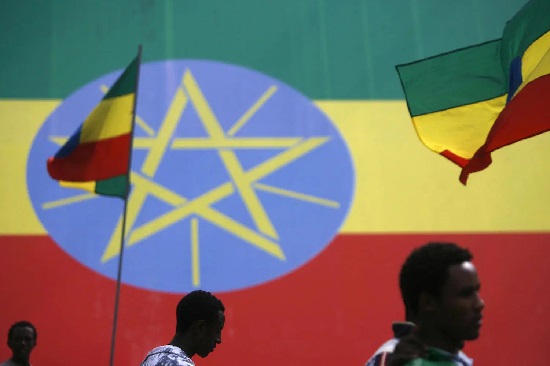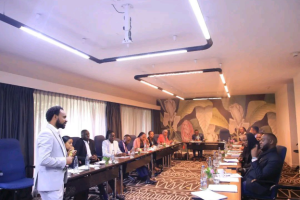
Ethiopia is experiencing a range of social, economic and political tumultuous since the reform following administration led by Prime Minister Abiy Ahmed (Ph.D.) took power in 2018. Because the Tigray People’s Liberation Front (TPLF) was unhappy with the new administration, it had aggressively engaged in provoking conflicts here and there throughout the country mainly with a view to averting the reform process. Following TPLF’s ill-equipped mission and nation destabilizing, perhaps collapsing it if it could, its relations with the federal government had gradually deteriorated and at the end of the day last year in November the former attacked the Northern Command Base, and it has been the ultimate national treason to regain power forcefully.
Right after the attack, the last step, the federal government forcibly indulged in law enforcement. The attack merely indicated that TPLF doesn’t care about the sovereignty of the country and the wellbeing of citizens, particularly the Tigray people. That is why even its leftovers after death are working with anti-peace elements to dismantle the country.
Since TPLF leftovers prefer playing a victim card to admitting the all rounded mess it has caused after the law enforcement operation, some international organizations and some foreign countries are imposing undue pressure on Ethiopia ignoring the reality on the ground. They are doing this via postponing and halting development and other kind of assistance mainly to arm-twist the country to achieve their hidden agenda.
Similarly last week the United States (US) announced visa restrictions on Ethiopian and Eritrean officials accusing the government of not taking meaningful steps to end hostilities in the region. The relation between the two countries is old aged and the recent US announcement of visa restriction on Ethiopia’s official will undermine the bilateral relation of the two countries.
Spokesperson of Ministry of Foreign Affairs of Ethiopia Ambassador Dina Mufti described the US’s imposition of visa restrictions on Ethiopian officials as unfortunate. Both previous and current measures would seriously undermine the Ethiopia-US long standing bilateral relations.
The visa restriction may jeopardize the horn region besides potential pressures it may cause. The decision is entirely groundless and unacceptable. He added that the decision made by the US didn’t consider Ethiopia’s commitment in allowing unfettered access to international media to observe the humanitarian situation in Tigray region.
Ethiopia’s historic and friendly relationship with the United States has stood the test of time. That is why the government finds it extremely regrettable that the implications of the visa restrictions and other related measures taken earlier will seriously undermine this longstanding and historical bilateral relationship.
The government cannot be compelled to sit down and negotiate with the TPLF, which has already been labeled as a terrorist organization. Any sort of attempt to resuscitate the terrorist group would be counterproductive and untenable.
The government of Ethiopia finds it unfortunate to learn about the decision by the United States to continue exerting undue pressure on Ethiopia by imposing visa restrictions on Ethiopian officials. This is an additional pressure to its previous decisions to restrict economic and security assistance to Ethiopia. This decision came at a time when the Ethiopian government has been engaging positively and constructively with the US administration on issues of common concern. This was the spirit with which the Ethiopian government welcomed the new US Special Envoy for the Horn of Africa, Mr. Jeffrey Feltman, who met and held extensive consultations with senior government officials, including the Prime Minister.
It also sends a wrong signal at a time when Ethiopia is gearing up to hold national elections, which is expected to usher in a new political dispensation in the country. The 6th National Elections would pave the way for an inclusive dialogue once a new government assumed office. Hence, at this important juncture, the Ethiopian government was expecting support and understanding, and not such an ill-advised measures to unnecessarily overshadow the elections.
Ethiopia attaches great importance to its historic and friendly relationship with the United States which has stood the test of time. That is why the government finds it extremely regrettable that the implications of the visa restrictions and other related measures taken earlier will seriously undermine this longstanding and important bilateral relationship.
What is even more saddening is the tendency by the US administration to treat the Ethiopian government on an equal footing with the TPLF, which was designated as a terrorist organization by the House of Peoples’ Representative. There is nothing more revealing than this to understand the misguided approach by the administration.
Ethiopia provides peacekeepers for the African Union missions in the neighboring nations of Sudan, South Sudan and Somalia. It has also been a key intelligence partner of Western nations monitoring armed rebels in the Horn of Africa. “The attempt by the US administration to meddle in internal affairs of Ethiopia is not only inappropriate but also completely unacceptable.”
The Ethiopian government has been consciously working to promote national dialogue through a series of engagements with wider sections of the Ethiopian society not because it was pushed from outside, but because it believes that this is the right thing to do to build the necessary national consensus in the country and chart out a better way forward.
As the Ethiopian government has made it clear again, apart from the ill-guided attempt the US administration to meddle in internal affairs, Ethiopia should not be told how to run and manage its interior matters.
As far as alleged human rights abuses committed in the Tigray region are concerned, the Ethiopian government is fulfilling its commitment to hold those responsible accountable. The Federal Attorney General’s has announced the outcome of its investigative work and the important steps taken towards ensuring accountability and justice. The Ethiopian Human Rights Commission and the United Nations Office of the High Commissioner for Human Rights (OHCHR) have already embarked on their joint independent investigation. Upon the invitation of the Ethiopian government, the African Commission on Human and People’s Rights (ACHPR) is also undertaking its investigations.
Furthermore, the Ethiopian government has not only demonstrated its willingness and commitment to work with the international community to respond to the humanitarian crisis in Tigray, but it has also provided full and unhindered access for humanitarian actors to operate in all parts of the region. It’s been doing all it can by mustering its meager resources and that of partners to reach out to all people in dire need of urgent assistance. The humanitarian actors operating on the ground know full well that the challenge at hand is related to issues of capacity and additional resources and not so much about access.
After the series of engagements with international partners, including the US and the tangible progress made in addressing some of the prevailing challenges, the decision by the US administration to impose visa restrictions and other measures is not only regrettable but will also seriously harm and undermine the constructive spirit of engagement and the significant gains achieved on the ground, not to mention the centuries old people-to-people relationships.
If such a resolve to meddle in our internal affairs and undermining the century old bilateral ties continues unabated, the government of Ethiopia will be forced to reassess its relations with the United States, which might have implications beyond bilateral relationship.
The Ethiopian government will not be deterred by this unfortunate decision of the US administration. It will continue its relentless efforts to overcome current challenges and lead the country on the path of lasting peace and prosperity. No doubt, the task ahead is daunting, but with the support and unity of our people, we remain confident that we shall overcome our difficulties and realize the hopes and aspirations of generations of Ethiopians for a peaceful and prosperous Ethiopia, ministry stated.
The US Senator Jim Inhofe opposed the announcement of visa restrictions imposed by the United States on Ethiopia. “I oppose the heavy handed visa restrictions from the Biden administration,” he tweeted. “Ethiopia needs our support as they work to end the sectarian violence. Actions like this don’t help us get closer to a peaceful resolution.”
Political and economic analyst of African development policy, Lawrence Freeman said that the visa restrictions the United States government has announced on Ethiopian officials and its curbs on economic and security assistance could endanger the entire Horn of Africa region apart from harming the two countries long standing cooperation.
Following the US announcement on visa restrictions and imposed wide-ranging restrictions on economic and security assistance to Ethiopia, he stated that “this new US posture towards Ethiopia is reckless and perilous.” Freeman noted that Ethiopia has played an indispensable role in ensuring peace and stability in East Africa and it has remained strong US ally in fighting terrorist and militant elements in the volatile region.
“The new US announcement of bilateral and possibly multilateral assault against Ethiopia will not only reverse decades of cooperation between the two countries, but also threatens the entire Horn of Africa and beyond,” he said.
As to him, these types of measures are usually reserved for enemies of the US and it is a strange and ‘reckless’ measure against its long time trusted ally. The US draconian assault against Ethiopia could potentially contribute to weaken the latter by encouraging more ethno-nationalist attacks on the government, the analyst added.
Unbelievably, a chameleon, TPLF and its accomplices have won US confidence and pushed to act against Ethiopia. ‘Truth will triumph in the end.’
BY HAILE DEMEKE
THE ETHIOPIAN HERALD MAY 28/2021




